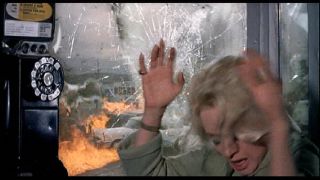The MacGuffin: News and Comment (06/Oct/2012)
(c) Ken Mogg (2012)
October 6
If you didn't give Hitchcock love, loyalty, or at least intelligent attention and appreciation, you were likely to find yourself cold-shouldered by him. That was your 'punishment'. Accordingly, I think there's more than a grain of truth in William Rothman's claim that the films themselves are 'punitive', designed ultimately to win an audience's 'acknowledgment' that Hitchcock was benignly - or anyway wisely - present all along. I reach this somewhat paradoxical conclusion about Hitchcock after studying him and his films for more than half a lifetime. And I believe that one crucial result of how Hitchcock presented himself, onscreen or offscreen, was that there were always at least two different Hitchcocks - the public and the private. The former was likely to be, of necessity, a superficial Hitchcock. The 'real' Hitchcock was something else again. At this point I would like to cite what is one of my favourite anecdotes in Stephen Rebello's fine book, 'Alfred Hitchcock and the Making of Psycho' (1990). It's the one told by costume designer Rita Riggs, referring to the carton of French strawberries that Hitchcock sent her. She notes his sense of fun and how she always thought of him as the prince locked in the frog: 'He loved beauty so much and set out to create it. I think his perversities and his frustration with his exterior were part of his wonderful creativity.' (p. 99) Add to this Hitchcock's Englishness and the sort of instinctual élitism he picked up from mixing in privileged circles in England between the wars (a phenomenon superbly analysed by John Carey in 'The Intellectuals and the Masses', 1992). Even in the US, Hitchcock might refer to 'the moron masses', causing John Steinbeck to tell a friend privately, 'Hitchcock really is one of those incredible English snobs who consider themselves superior to the working classes'. So, again, I think you have the two Hitchcocks - the rather superficial one and the one known to his friends and close acquaintances. The first of the Hitchcocks was capable of making enemies, including anyone who felt rebuffed by him (more on that in a moment). The second was much more likely to amuse and amaze, for there are countless testimonies to the depth and richness of Hitchcock when in relaxing company. The most glowing yet rounded of such testimonies is probably John Houseman's (for which, see my profile of Hitchcock on the 'Senses of Cinema' website). But Joan Fontaine's is also very nice: 'Hitch had a good ear [for dialogue and delivery]. He had patience, authority. He had taste. Most of all, he had imagination.' And Fontaine adds that 'We liked each other and I knew he was rooting for me' - although she was aware that Hitch did, indeed, want 'total loyalty'. ('No Bed of Roses', 1978, pp. 106-07.) But, yes, Alfred Hitchcock could make enemies. I'm reliably told that many industry people were bitterly offended when he 'foisted' an unknown actress named 'Tippi' Hedren on them, and seemed to take her star-quality for granted, without their say-so. This resentment of Hitchcock - and to some extent Hedren - still lingers on, I'm told. Keep that in mind. Then there were the mischief-makers. I'll single out filmmaker Kenneth Anger, author of 'Hollywood Babylon', volumes I and II. In the latter, Anger included a scurrilous - because untrue - account of how Grace Kelly performed a striptease for Hitchcock who was watching her by prior agreement through binoculars from the other side of Laurel Canyon. The chapter, called "Closely Watched Blondes", is rounded out with a coloured account of Hitchcock's relations with Tippi Hedren during the making of The Birds and Marnie. More soon on the Hedren matter - in which, as we've often heard, Hitchcock was not on his best behaviour. But how do I know that the Grace Kelly story is untrue? Apart from its obvious air of the fantastical, that is? Because I'm told that it was in fact made up by journalist and film writer David Del Valle who spoke to an audience at the American Cinematheque, Los Angeles, on March 24 2004. There, he revealed that he had fabricated several stories for the second volume of 'Hollywood Babylon', including both the Grace Kelly one and the story about actor George Zucco going crazy and claiming to be pursued by H.P. Lovecraft's fictional entity the Great Cthulhu! Del Valle explained that the publisher of the first 'Hollywood Babylon' had commissioned a sequel but that Anger had largely run out of old-time Hollywood gossip and so needed to pad out the new book with made-up stories. The trouble is, in the case of the Hitchcock entry, which also drew on the recently-published Hitchcock biography, 'The Dark Side of Genius' (1983), by Donald Spoto, it contributed to what I'll call 'urban mythmaking' about Hitchcock - albeit the superficial 'Hitchcock', which is what the public, compounding an error, further confuse with the real person. And now, to again distort matters, comes the slanted, made-for-TV film about Hitchcock and Tippi Hedren - The Girl - due to screen on HBO in the US on 20 October, and on BBC2 in December. I'll preview it here next time. The frame-capture below from The Birds will form a crucial part of my case. (My thanks to RM for information about David Del Valle's talk at the American Cinematheque.)
This material is copyright of Ken Mogg and the Hitchcock Scholars/'MacGuffin' website (home page) and is archived with the permission of the copyright holder. |

